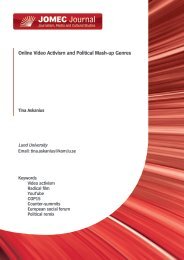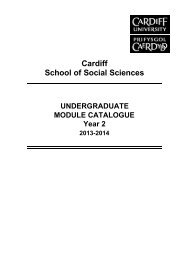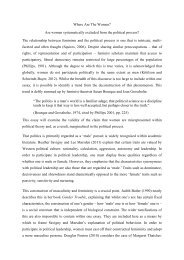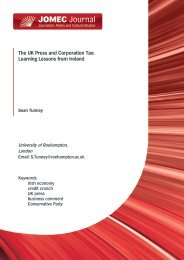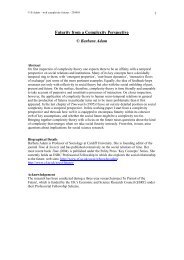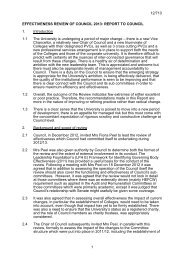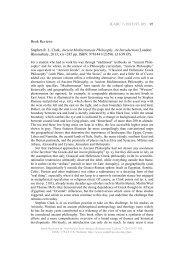APHRODITE IN PROCLUS' THEOLOGY - Cardiff University
APHRODITE IN PROCLUS' THEOLOGY - Cardiff University
APHRODITE IN PROCLUS' THEOLOGY - Cardiff University
You also want an ePaper? Increase the reach of your titles
YUMPU automatically turns print PDFs into web optimized ePapers that Google loves.
JLARC 3 (2009) 21-43 27<br />
good, and with the desire and trust of the glutton grasps at the idol of beauty and<br />
remains joined to the fall without accessing the perfection appropriate to the real<br />
eroticism (translation mine).<br />
Proclus does not condemn the pursuit of earthly love as such. Neither should<br />
his thoughts regarding the contrast between the goddesses be interpreted in a<br />
manner that would equate Aphrodite with an amorous life driven by passion. But<br />
the goddess is not only these aspects, especially contemplated as a leading deity in<br />
her own divine series. The real erotic summit belongs to Aphrodite:<br />
In Remp. 1. 109, 1-3: ὁ γὰρ δὴ τελέως ἐρωτικὸς καὶ Ἀφροδίτῃ μέλων ἐπ’ αὐτὸ τὸ<br />
θεῖον κάλλος ἀνάγεται τῶν ἐν αἰσθήσει καλῶν ὑπερορῶν.<br />
...because a perfectly erotic being, who is taken care of by Aphrodite, ascends towards<br />
divine beauty itself, despising the beautiful things on the level of the sensible<br />
(translation mine).<br />
Proclus thus links Aphrodite with the authentic erotic madness which functions<br />
as a springboard for the soul's purification. 26 However, Aphrodite’s series also<br />
provides for those beauties that are perceptible on the corporeal and material<br />
levels.<br />
In Remp. 1.109,3-7.: ἐπεὶ δὲ καὶ τοῦ ἐμφανοῦς κάλλους καὶ τοῦ ἐν ὕλῃ τὴν ὑπόστασιν<br />
ἔχοντος εἰσί τινες Ἀφροδισιακοὶ προστάται δαίμονες, διὰ δὴ τοῦτο καὶ ὁ τὸ<br />
εἴδωλον περιέπων συνεργοῦ λέγεται τῆς Ἀφροδίτης τυγχάνειν<br />
At the same time there exists certain aphrodisiac demons who supervise apparent<br />
beauty and that which is seen in matter and, because of that, it is said that such a<br />
person who respects an idol has gained the help of Aphrodite (translation mine).<br />
In the Commentary on the Republic Proclus discusses divine possession in connection<br />
with Aphrodite. 27 He cites with evident approval the argument of his predecessor,<br />
the Neoplatonist Theodore of Asine, that divine possession could also<br />
happen to women. Theodore’s example is Helen of Sparta. Aphrodite filled Helen<br />
with graces regarding her soul and body to such an extent that Helen was born to<br />
be like a new Aphrodite, who coming from the sky, cheated the barbarian (i.e.,<br />
Paris) into thinking that he possessed something that he did not in reality. Helen<br />
with whom Paris lived was not real but some kind of idol. The Egyptians among<br />
whom Helen lived taking part in the holy rituals have kept in their memory an<br />
authentic image of Helen, but among the Greeks “men of the theater” slandered<br />
26 On this salvific role of love see also, for example, De sacrificio et magia 148, 1-3; Theol.<br />
Plat. 1. 113,.4-10.<br />
27 In Remp. 1 254,29-255,28.<br />
Tuomo Lankila, ‘Aphrodite in Proclus’ Theology,’ in: Journal for Late Antique Religion and<br />
Culture 3 (2009) 21-43; ISSN: 1754-517X; Website: http://www.cardiff.ac.uk/clarc/jlarc




